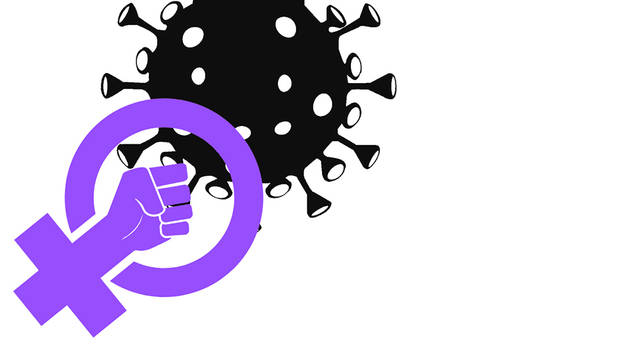
The current COVID-19 pandemic affects the whole of society, but it is certainly not a sickness as democratic as many have argued. It does not affect equally women* and men*, the rich and the poor, the old and the young, or People of Colour and white people. Instead, this pandemic magnifies all existing inequalities and severely impacts those who are already vulnerable and disadvantaged. People who live and work at society’s margins are exposed to the highest risk of infection and hardship, and are further stigmatised as a result.
This Feminist Manifesto was written by the members of the Rosa-Luxemburg-Stiftung’s European Feminist Working Group. We live and work all over Europe, in Belgium, Czech Republic, Germany, Greece, Poland, Russia, Serbia, Spain, the United Kingdom and Ukraine.
Among the particularly vulnerable groups are women*—especially those in low-paid professions—lesbian, bisexual, queer and trans persons, migrants and Roma communities. Women* with young children or other domestic and caring responsibilities experience social insecurity, have lower levels of wealth, are more likely to be in part-time, low-paid and precarious work, and are immediately threatened by a loss of income. Women* are also more likely to work in health care and in other services now deemed “essential”, making them more exposed and vulnerable to infection. The current situation is particularly dangerous for women* and children sharing their home with an abuser, as growing numbers of domestic violence incidents during lockdown demonstrate. The restrictions on movement take it for granted that home is a safe place, but due to the quarantine and social isolation, many victims are imprisoned in their violent surroundings and have limited opportunities to seek help.
The pandemic has already had a severe impact on our physical and psychological well-being. Once we start to socialize again, the trauma or re-traumatization that many have experienced—either because of the jobs they are doing or because of the lockdown more generally—will influence people’s behaviour and reshape our relationships with others in the long run. This will be particularly pronounced for workers in the health and care sectors, which are disproportionately feminized.
The pandemic has caused a global crisis and its distorting effects will last for years. While the fall out may appear to threaten feminism’s progress, it also offers an opportunity. It is extremely important that the measures introduced now take into account the gendered impact and this perspective must be used to find appropriate solutions to the current situation. This crisis offers a chance to stop and think about the type of world we want to live in, pushing for one where people and solidarity are prioritized over capital and corporate interests.
This manifesto is a joint intervention into the coronavirus crisis from a pan-European, left, feminist perspective. However, the demands and recommendations listed in this manifesto are the outcomes of feminist theoretical, activist, and political struggles that have existed for decades. Far from complete, we are engaging with the following distinct and yet interconnected issues to initiate further discussion and action:
- The change to a feminist economy, climate justice and solidarity
- The threat authoritarianism poses to democracy and feminism, and what to do about it
- Feminist class struggles in health, care and other “front-line” sectors
- Bodily and mental integrity and the right to protection against violence
- Migration and the inhumane body politics of border control
We are setting out these issues with the idea to inspire radical solidarity during and after the crisis as well as to influence political discussions and decisions that often lack left feminist approaches. Our recommendations can assist leftist and feminist movements, but also various institutions and political organizations, in developing concrete policies and demands.
Throughout this document we use the term women* to emphasise that we include trans, queer and non-binary genders, as well as those affected by misogyny, or women-related issues, in our understanding of women*.